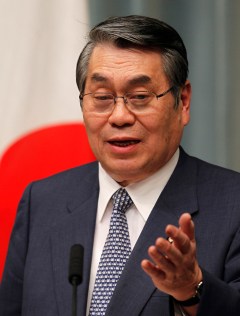Tanaka becomes Japan's defense minister
TOKYO – Japan’s new Defense Minister Naoki Tanaka seems to have done the impossible: He’s gotten off to an even worse start than his predecessor, who was fired after just four months on the job.
Tanaka is to meet with senior U.S. officials in Tokyo next month for talks on relocating U.S. Marines on Okinawa. It’s an important issue for both sides, but has been stalled for years by intense local opposition.
Tanaka’s appointment last week seems unlikely to make things easier.
The new defense chief had barely assumed office when he announced that construction would start on a replacement facility for the Marines’ Futenma airbase by year’s end. That infuriated Okinawa officials, who have final say on the plan, and forced Tanaka and Prime Minister Yoshihiko Noda to issue quick retractions.

Tanaka / Reuters
Days later, in an interview with national broadcaster NHK, Tanaka seemed to confuse the restrictions on the use of weapons by Japanese troops on missions overseas with the ban on weapons exports by Japanese companies. These are hot-button issues in largely pacifist Japanese and cast further doubts on Tanaka’s knowledge and credibility.
It was a disappointing start for Japan’s defense community, which had hoped for a change from the incompetence of former Defense Minister Yasuo Ichikawa. Appointed in September, Ichikawa was fired last week after a series of gaffes and missteps that included declaring himself an “amateur” on defense issues and professing ignorance of an infamous 1995 rape of a schoolgirl by U.S. servicemen in Okinawa. That incident galvanized opposition to the U.S. presence in Okinawa and led to a 2006 agreement to close the Futenma base and relocate thousands of US troops.
That agreement has yet to go into effect. More than half the 45,000 or so US troops in Japan are still based on Okinawa.
Whether Tanaka will last as long or have more success than his predecessor is unclear.
Like Ichikawa, Tanaka has relatively little experience on defense issues (he headed the upper house’s foreign affairs and defense committee for a term). He was appointed to Noda’s Cabinet largely to shore up support within the fractious Democratic Party of Japan. Tanaka began his political career after marrying the daughter of former prime minister and power broker Kakuei Tanaka; as part of the marriage, he changed his name became an adopted member of the Tanaka family. Though his wife Makiko Tanaka rose to foreign minister under the Koizumi administration and remains an outspoken and high-profile Diet member, Naoki Tanaka has toiled in relative obscurity until his appointment last week.
On the Futenma issue alone Tanaka will have his work cut out for him. Tokyo and Washington recently cut initial funding for the relocation plan, which had risen in cost from $10 billion to almost $30 billion. Okinawa Governor Hirokazu Nakaima has long opposed the plan and says he won’t change his mind, virtually ensuring that Tokyo and Washington will have to re-start negotiations from square one.
After that, Tanaka can begin worrying about the increasing military pressure from China and the continuing threat of North Korean nukes. Just the thing for Japan’s newest “amateur.”


